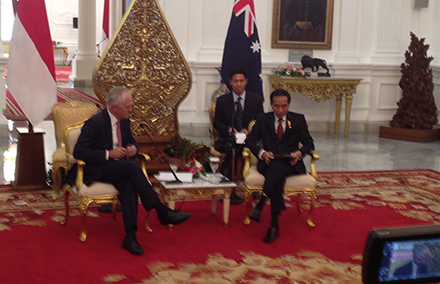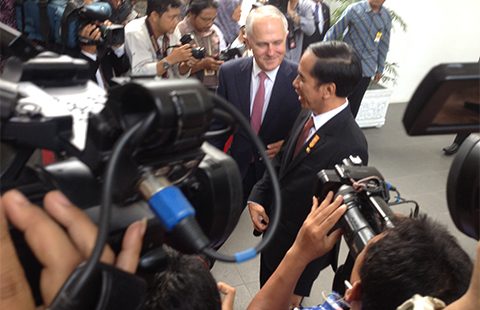
Photo: Ross Tapsell
Ross Tapsell reports on Australian PM’s fly in, fly out visit to Jakarta.
When charting the difficult Australia-Indonesia relationship back in 1990, journalist Peter Hastings wrote:
In the end two radically different political cultures faced each other across the narrow gap of the Timor Sea, neither really able to understand each other.
Even in democratic Indonesia, it hasn’t been easy. One needs only to recall Tony Abbott’s first trip to the Indonesian Palace to meet Jokowi, where the two sat in prolonged awkward silence before Jokowi opened the conversation with “if we have a problem, you can talk to my ambassador because for me communication is important”. The Australian press reported it as a disastrous ‘first date’, and it didn’t get any better for the pair throughout Abbott’s short reign.
This year the death penalty issue dominated the framework of the relationship, and recent allegations of the Australian navy paying boats to return to Indonesia (not denied by the Australian government) meant Turnbull’s trip had the potential of being rather tense.
It came as some surprise that the visit even went ahead at all, given that the two leaders will meet in the G20 in a few days’ time. But a nine-hour stop-over visit to Jakarta was a gesture to, as they say, ‘get the relationship back on track’ – even if nobody ever really defines what ‘on track’ is. Presumably, however, friendly relations between leaders is a significant part of it.
So, enter Turnbull.
Jokowi greeted him at the Palace, and there was a discussion on the porch between the leaders and their wives, the contents of which no one could hear as the media was kept at a safe distance. The staffers probably thought that should the conversation end up being similar to the Abbott-Jokowi train-wreck, at least the sound recorders wouldn’t be there this time.
Once the closed door discussions concluded, the two leaders reported to the media pack.* Jokowi has developed a habit at these formal occasions to bring along notes, and he always looks stilted and over-rehearsed. He initially spoke very briefly, congratulating Turnbull for becoming PM, thanking Australia for assistance with the forest fires, and welcoming the opening of an Australian consular office in Makassar. It was a cautious start.
Later he would show a bit more enthusiasm when he briefly discussed infrastructure, investment, cattle trade, and his new favourite topic, the so-called ‘digital economy’. He said ‘by 2020 the forecast of Indonesia’s digital economy will be 130 billion USD’, and that ‘Australian investors should invest in this field’. Get your shares in Go-Jek early, dear readers.Turnbull began by the usual mention of Australia’s support for Indonesia independence, the Lombok treaty etc, but spoke without notes and displayed friendly enthusiasm.
He said he was welcomed with ‘enormous warmth’, had ‘frank and exciting discussions’ and various other superlatives. Turnbull spoke for twice as long as Jokowi, and in perhaps what is indicative of the Australia-Indonesia relationship, initially he seemed far more eager to make the day work than Jokowi did, although this is not to say that Jokowi always looked disinterested. Jokowi seemed at his happiest when Turnbull mentioned that they were ‘both businessmen’, and trade was clearly the focus of the discussions (or at least that was what was presented to the media).
But overall things seemed to be going well enough, even if most of the Canberra-based press pack didn’t seem particularly interested in what was going on. After a lunch in which the press were not invited, it was time for blusukan. Ah, the blusukan, which catapulted Jokowi to fame. In January 2014, after following Jokowi on numerous blususkans, I described them as where Jokowi “arrives, unannounced, in different parts of Jakarta to talk with local people about the issues affecting them. I went on to write:
His skill lies in being interested in the details: where the bus stops, how the rubbish is collected, where the drains are blocked…Jokowi and Ahok also turn up at government offices, followed closely by television cameras, and have often caught public servants resting on their laurels. In a city crippled by traffic chaos, frequent floods and a debilitating bureaucracy, these visits helped create the hope that the two men would find solutions to some of Jakarta’s biggest problems.
While the media were always central to its success, unsurprisingly by 2015 as President, Jokowi’s blusukans have become a well-rehearsed, somewhat formulaic media stunt. Jokowi and *insert official guest* arrive with a large crowd waiting (which they’ve known for some time given the security detail needed). He and his guest push their way through the indoor market with the rakyat, take selfies, pretend to look at some shops, and finally give an ‘impromptu’ press conference. It has become so formulaic that some of the Indonesian media at the Palace weren’t interested in coming along. ‘I don’t need to see another blusukan’, one journalist told me.
Nevertheless, given the contemporary media’s voracious yearning for news updates and photos, most news organisations did attend, as did a huge crowd. When I asked one elderly lady at the market if she was here to meet the Australian Prime Minister, she said ‘I didn’t know [he was coming], but I’m happy to!’

Photo: Ross Tapsell
She would get her wish, as both Turnbull and Jokowi shook her hand, and she seemed completely chuffed. Turnbull did a fine job holding it together at the press conference as sweat poured down his brow, trying to sensibly respond to probes such as what he thought of Indonesia joining the Trans-Pacific Partnership. It was indeed hot, but the things seemed to be going according to plan – what better way for two grown men to establish a lasting bond than to battle the searing crush of humanity by sweating it out together in a jam-packed indoor Indonesian market.
For Jokowi, this event was like shelling peas, and a vastly different and more comfortable man appeared than the one reading notes in the Palace earlier. He smiled, joked, shook hands, waved to the crowd, told the standard story about how he transformed the market, and even seemed to recognise a few people in the crowd. Once he had generously escorted his foreign guest to the safety of his vehicle – who concluded that the day was ‘fantastic’ – Jokowi stayed for a few more photos with adoring fans.
A populist media stunt it may have been, but given the shares of photos on Indonesia’s vibrant and expanding social media platforms, the positive reports in the Indonesian online media, and the way in which Turnbull handled himself with his host, it could be seen as none other than a complete success. It was also a nice way for Turnbull to distinguish himself from his predecessor, who often looked like a fish out of water in most foreign countries other than Canada or the UK. Indonesia’s main newspapers the next day seemed to pick up on this distinction.
It also suggests that anti-Australian sentiment in Indonesia surrounding Abbott’s tsunami aid comments and Indonesia’s ‘sovereignty’ were never deeply entrenched. The ‘coins for Abbott’ campaign, like many social-media-driven moments, saw passions ignited intensely at first, but the feelings were not particularly long-lasting.
This possibly cannot be said for many Australians, where the death penalty has had a more lasting negative sentiment towards Indonesia. Scan the comments on Malcolm Turnbull’s Facebook page photos of the blusukan and judge for yourself. It shows much more work needs to be done in the relationship, and that tangible outcomes for programs and partnerships between the two countries must continue and be expanded upon in the future.
Of course, a nine-hour visit was never going to dramatically change the state of the Australia-Indonesia relationship. But the visit seemed a positive start, and the fact that Jokowi would approve a blusukan visit is a positive sign, knowing they generally guarantee a good news story. Turnbull should have learnt much about the ‘two Jokowi’s’ in his short day in Jakarta.
Perhaps too, given both leaders seemed to enjoy the blusukan, our political cultures are not as ‘radically different’ as they once were.
Ross Tapsell is a lecturer at the School of Culture, History and Language at the ANU College of Asia and the Pacific.
*I would like to thank the Indonesian Palace media staff for allowing me access and for their warm and friendly assistance.
 Facebook
Facebook  Twitter
Twitter  Soundcloud
Soundcloud  Youtube
Youtube  Rss
Rss 